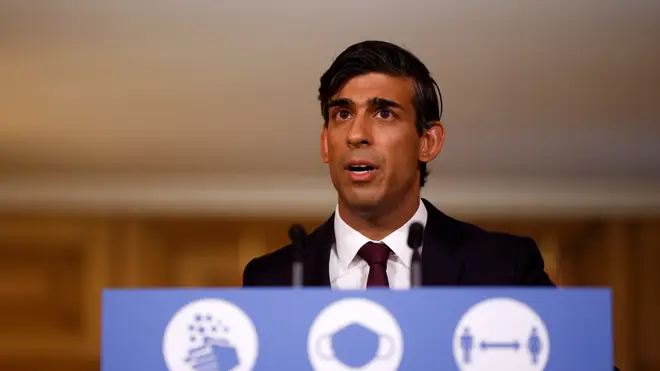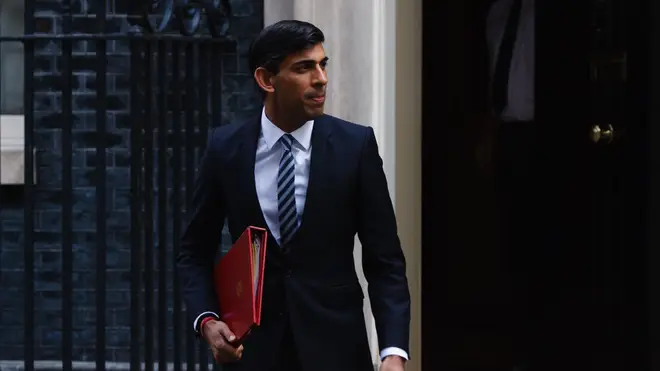
Clare Foges 6pm - 9pm
24 September 2020, 20:15 | Updated: 7 June 2023, 08:56

Rishi Sunak's latest package of economic measures marked another major step in the government's response to Covid-19.
In normal times it would be unthinkable that any government, least of all a Conservative one, would continue to spend billions of pounds subsidising the wages of people in jobs that may soon not exist.
But these are not normal times.
The Chancellor's latest support measures include an extension of two government loan schemes and of the VAT cut for hospitality and tourism.
But the most headline-worthy announcement was of a new Jobs Support Scheme that will help companies keep people in work over the difficult winter months.
Read more: Chancellor Rishi Sunak's job support scheme - everything you need to know
The new plan was welcomed by the CBI and, more cautiously, by Labour and the TUC.
It is undoubtedly another huge intervention by the government, but given the scale of the challenges the UK faces in the coming months, there remain questions over whether it will be enough.

Rishi Sunak announces new measures to protect jobs
Everyone in Westminster is all too aware that many thousands of jobs are going to be lost in the coming months, and that many companies will not survive the winter.
As Sunak himself put it with brutal honesty: "I cannot save every business, I cannot save every job. No Chancellor could."
Ministers fear that unemployment could soar into the double digits when the furlough scheme finishes at the end of October.
That would be a political nightmare as well as an economic one.
Read more: Self-employed say Rishi Sunak's winter economy plan offers 'no help at all'
Today's announcements were designed to avoid such a scenario, by helping employers to keep staff in work.
But the new Jobs Support Scheme is much less comprehensive than the furlough scheme it is replacing.
Whereas under the furlough scheme the government paid up to 80 per cent of a workers' wages, under the new scheme the government contribution will be capped at 22 per cent.

What's more, the scheme will only apply to workers who are able to work at least a third of their normal hours - something that in many companies will not be feasible.
The Chancellor firmly rebuffed calls from opposition parties for the existing furlough scheme to be extended in some sectors, insisting today that such a move was "not affordable and not sustainable".
That's not just because of the financial cost - already almost £40bn - but also because the Chancellor does not want to subsidise jobs that now only exist because the furlough scheme is maintaining them.
That's why, under the new scheme, only people in jobs considered "viable" will receive government support. Viability will be demonstrated by an employee working at least 33% of their usual hours, paid for by their employer.
Read more: Many on furlough likely to lose jobs, IFS warns
Read more: UK records 6,634 new coronavirus cases in highest ever single-day rise
This will be highly contentious, because the definition of a "viable" job is so subjective. There are some companies that will not survive because of fundamental changes to our lives as a result of Covid-19.
Sandwich shops in city centres are a good example - they are able to open and operate largely as normal but because so many people are working at home, and will be for the foreseeable future, the demand they rely on simply isn't there. Many of those jobs are therefore unviable.
The government's position is that it would not make sense for the state to keep funding them even when there is not enough demand for their services.

Boris Johnson fully behind Chancellor's coronavirus support for workers
But there are other companies for which the fundamentals of their business may be unchanged, but which are unable to open because of government restrictions.
Once restrictions are lifted, the demand for, let's say, theatre stewards, wedding photographers and sports stadium staff are likely to be fundamentally unchanged - in most cases, their or their employers' business model should still be effective and profitable.
The only reason they are not currently is because of current restrictions.
Can we really say that those jobs, which would be in demand as soon as restrictions are lifted, are not "viable", when it is only the government-imposed rules that is making that the case?
There is a fundamental difference between businesses and jobs that will be lost because the world has fundamentally changed and demand for their services has plummeted, and those that risk going under purely because of the current restrictions.
Businesses that are unable to open will be able to apply for other support, but that is unlikely to be enough to allow them to retain staff who aren't able to work at all.
The new Jobs Support Scheme also risks incentivising employers to lay off some staff and employ others on a full-time basis.
Otherwise, they face the prospect of having to pay 55 per cent of the wages of someone who is only working 33 per cent of the time.
Indeed, according to the Resolution Foundation, the scheme will mean that it would cost employers a third more to retain two employees working half-time than it would to retain one on a full-time basis.
However, this is what the Treasury's Job Retention Bonus is designed to prevent. Firms will receive £1,000 for every employee they keep on the books until the end of January - a big incentive for them to do so.
Ultimately no one doubts that many jobs will be lost in the coming months - Sunak was frank about that during today's press conference.
He was just as honest about the difficulties in predicting exactly how many jobs will go and, conversely, how many his new scheme will protect.
The government hopes that today's significant announcement will go a long way to keeping many people in jobs that would otherwise have been lost.
But how successful that will be depends largely on what happens with the virus in the coming weeks.
Rishi Sunak made clear that he stands "ready to do more as the situation evolves".
As the months go on and Covid cases continue to rise, few would bet against him needing to.